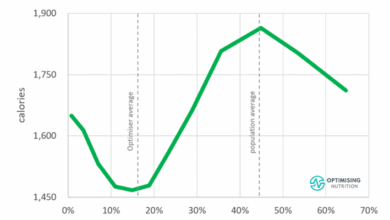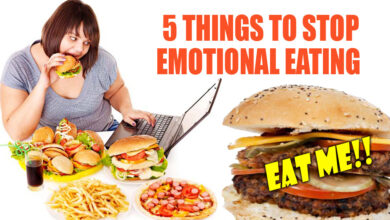
How to stop overeating? This guide dives deep into the multifaceted nature of overeating, exploring the psychological, physiological, and environmental factors that contribute to this common struggle. We’ll examine everything from emotional triggers and dietary strategies to behavioral modifications and lifestyle adjustments, offering a comprehensive approach to understanding and overcoming overeating habits. We’ll also discuss the crucial role of professional support in this journey.
This isn’t just about counting calories or willpower; it’s about understanding the root causes of your overeating and developing sustainable strategies for long-term change. We’ll unpack the complex interplay of emotions, habits, and environment to help you find lasting solutions. We’ll equip you with actionable insights and practical techniques to reclaim control over your eating habits and achieve lasting well-being.
Understanding Overeating Triggers
Overeating is a complex issue with various contributing factors. It’s not simply a matter of willpower; understanding the underlying triggers is crucial for developing effective strategies to manage and overcome this challenge. Identifying these triggers allows individuals to address the root causes rather than just the symptoms. This exploration delves into the psychological, physiological, emotional, environmental, and stress-related factors that contribute to overeating behaviors.
Psychological Triggers
Psychological factors play a significant role in overeating. Cognitive distortions, such as negative self-talk or perfectionistic tendencies, can lead to feelings of inadequacy or stress, which in turn can trigger the desire to eat as a coping mechanism. Low self-esteem and a history of trauma can also contribute to emotional eating. Boredom, anxiety, and loneliness are frequently cited as triggers for overeating.
These emotional states can lead to impulsive food choices as a way to temporarily alleviate discomfort.
Physiological Factors
Physiological factors also contribute to overeating. Hormonal imbalances, such as fluctuations in insulin or leptin levels, can affect appetite regulation, making it difficult to control food intake. Metabolic conditions, including hypothyroidism or diabetes, can influence the body’s ability to process and utilize nutrients, potentially leading to increased hunger and cravings. Certain medications, such as some antidepressants or corticosteroids, can also impact appetite and metabolism, thereby potentially contributing to overeating.
Emotional Eating
Emotional eating is a common phenomenon where individuals turn to food to cope with difficult emotions. This coping mechanism can become a pattern, leading to overeating as a way to manage stress, sadness, anxiety, or boredom. Recognizing and addressing the underlying emotional needs is essential to breaking this cycle. Emotional eating can manifest in various ways, including comfort eating, stress eating, and emotional numbing.
Understanding the specific emotional triggers associated with overeating is vital for developing effective strategies for managing these triggers.
Environmental Influences
Environmental factors can significantly impact eating habits. The availability and accessibility of high-calorie foods, the presence of tempting food cues in the home or workplace, and the presence of stressful or overwhelming situations can all contribute to overeating. The presence of social pressures to eat or the lack of support for healthy eating choices can also play a role.
Social gatherings, holidays, or even routine meals with family can trigger overeating if not approached mindfully.
Stress and Overeating
Stress is a potent trigger for overeating. When stressed, the body releases cortisol, a hormone that can increase appetite and cravings for high-calorie foods. This stress response, coupled with a tendency to use food as a means of coping with stress, can create a vicious cycle. Chronic stress, in particular, can lead to persistent overeating patterns. Recognizing stress triggers and developing healthy coping mechanisms is crucial in managing stress-related overeating.
Controlling portion sizes is key to stopping overeating, but sometimes it’s more about what you’re eating. Focusing on foods good for high blood pressure, like those highlighted in this article foods good for high blood pressure 2 , can actually help curb cravings and make you feel fuller longer, which in turn makes it easier to avoid overindulging.
Ultimately, a balanced approach that considers both portion control and the types of foods you eat is the best way to stop overeating.
Table of Overeating Triggers
| Trigger Type | Description | Examples | Strategies to Mitigate the Trigger |
|---|---|---|---|
| Emotional | Overeating as a response to difficult emotions, such as stress, sadness, anxiety, or boredom. | Comfort eating, emotional numbing, stress eating. | Identifying emotional triggers, practicing mindfulness, developing healthy coping mechanisms (e.g., exercise, meditation), seeking professional support. |
| Physiological | Biological factors affecting appetite and metabolism. | Hormonal imbalances (e.g., insulin resistance), metabolic conditions (e.g., hypothyroidism), medication side effects. | Consulting with a doctor or nutritionist, managing underlying medical conditions, adjusting medication as needed. |
| Environmental | External factors that influence food choices and eating behaviors. | High-calorie food availability, stressful situations, social pressures, lack of support for healthy eating. | Creating a supportive environment, limiting access to unhealthy foods, planning meals in advance, practicing mindful eating. |
| Stress-related | Overeating triggered by stress hormones (e.g., cortisol) and the tendency to use food as a coping mechanism. | Stress eating, increased cravings for high-calorie foods, emotional eating during stressful periods. | Identifying stress triggers, developing healthy stress-reduction techniques (e.g., exercise, relaxation techniques), seeking professional support for stress management. |
Dietary Strategies for Overcoming Overeating
Understanding your triggers is a crucial first step, but effectively managing overeating also requires strategic dietary approaches. This involves thoughtfully selecting foods, portioning them appropriately, and incorporating mindful eating practices. By making conscious choices about what you eat and how you eat it, you can significantly reduce the likelihood of overindulgence.Dietary approaches for overeating management encompass a variety of strategies, each with its own set of principles and potential benefits.
These methods can be tailored to individual needs and preferences, offering a path towards healthier eating habits and a more balanced relationship with food.
Healthy Dietary Approaches, How to stop overeating
Various approaches exist for reducing overeating. These strategies often focus on balanced nutrition, portion control, and mindful eating techniques. Each approach has unique principles and can lead to positive changes in eating habits.
- Mindful Eating: This approach emphasizes paying attention to the sensations associated with eating, such as hunger cues, taste, and texture. It encourages slowing down, savoring each bite, and recognizing fullness cues. Mindful eating helps you become more aware of your body’s signals, reducing the likelihood of mindless overeating.
- Balanced Meal Planning: This involves creating meals that include a variety of nutrient-rich foods from all food groups. This ensures you’re getting the necessary vitamins, minerals, and other essential nutrients. Balanced meals help to regulate hunger and cravings, preventing overeating by keeping your body and mind satisfied.
- Portion Control: This strategy focuses on regulating the amount of food consumed at each meal. Using smaller plates, measuring food portions, and being mindful of serving sizes are key components of portion control. It helps to prevent consuming excess calories and promotes a healthier relationship with food.
- Calorie Counting or Tracking: This involves monitoring the number of calories consumed throughout the day. Tools like food journals or apps can help track intake and identify areas for improvement. It provides a quantifiable method for managing portion sizes and overall calorie intake. This can help identify patterns and make adjustments to reduce overall calorie consumption, leading to weight management.
Comparing Dietary Approaches
The table below provides a comparative overview of various dietary approaches to overeating.
| Approach Name | Key Principles | Benefits | Potential Drawbacks |
|---|---|---|---|
| Mindful Eating | Paying attention to hunger and fullness cues, savoring food, and eating slowly. | Increased awareness of body signals, reduced mindless eating, potential for better digestion. | Requires practice and discipline, may not be suitable for all individuals, can be challenging to implement in fast-paced environments. |
| Balanced Meal Planning | Including a variety of nutrient-rich foods from all food groups in each meal. | Provides essential nutrients, regulates hunger and cravings, promotes overall health. | Requires knowledge of nutritional needs and food choices, may require significant dietary adjustments for some. |
| Portion Control | Using smaller plates, measuring food portions, and being mindful of serving sizes. | Reduces calorie intake, helps manage weight, improves overall health. | Can be challenging to implement consistently, may require adjustments to established eating habits. |
| Calorie Counting/Tracking | Monitoring calorie intake throughout the day using tools like food journals or apps. | Provides quantifiable data for managing intake, identifies patterns in eating habits. | Can be time-consuming and require meticulous record-keeping, potential for over-focus on numbers, can be difficult to sustain long-term. |
Choosing Nutrient-Dense Foods
Selecting nutrient-dense foods is crucial for managing overeating. These foods provide essential vitamins, minerals, and fiber without excessive calories. Focus on fruits, vegetables, lean proteins, and whole grains. Examples include leafy greens, berries, lean poultry, and quinoa.
Importance of Hydration
Regular hydration plays a vital role in managing appetite. Water helps to regulate hunger and fullness cues. Drinking water before meals can help to reduce the feeling of hunger and prevent overeating. Staying well-hydrated is an important part of a healthy lifestyle and contributes to overall well-being.
Behavioral Modifications for Overeating Control

Overcoming overeating goes beyond simply understanding your triggers and adopting healthier dietary strategies. Crucial to long-term success is modifying your behaviors to create lasting positive changes. This involves recognizing patterns, developing healthy coping mechanisms, and setting realistic goals. Effective behavioral modifications are not about drastic measures, but about implementing sustainable adjustments to your daily routine.Behavioral modifications provide a framework for actively managing overeating by addressing the underlying behaviors that contribute to the problem.
Stopping overeating can be tough, but focusing on mindful eating habits is key. Understanding your triggers and practicing portion control are crucial steps. While some might argue that opioid meds don’t hurt infants, as discussed in this article ( opioid meds dont hurt infants ), the connection to overeating is often about emotional coping mechanisms. Ultimately, finding healthy ways to manage stress and emotions is a vital part of curbing overeating.
These strategies empower individuals to take control of their eating habits and build healthier relationships with food. By understanding and implementing these strategies, individuals can achieve lasting changes in their eating patterns.
Self-Monitoring for Recognizing Overeating Patterns
Self-monitoring is the cornerstone of behavioral modification for overeating. It involves tracking your eating habits, including the types of foods consumed, portion sizes, and emotional states during meals. This process allows you to identify patterns and triggers, such as emotional eating, boredom eating, or eating in response to stress. Regular journaling, using a food diary, or employing a dedicated app can aid in this process.
By recording your meals and feelings, you can begin to see the connections between your behavior and your eating habits. This knowledge is critical for developing tailored strategies to address these patterns.
Developing Healthy Coping Mechanisms
Developing healthy coping mechanisms is essential for managing emotional eating. Identifying and understanding your emotional triggers is the first step. These triggers might include stress, anxiety, boredom, or loneliness. When these emotions arise, you can learn to substitute unhealthy eating habits with healthier alternatives. These alternatives might include engaging in physical activity, spending time with loved ones, pursuing hobbies, listening to music, or practicing mindfulness.
Practice these coping mechanisms regularly to reinforce their effectiveness in managing cravings.
Setting Realistic Goals
Setting realistic goals is paramount for sustainable behavior change. Ambitious, unattainable goals often lead to frustration and abandonment of the process. Instead, focus on small, achievable steps. For example, instead of aiming to eliminate all sugary snacks, start by reducing their frequency or portion size. Celebrate each small victory to reinforce positive behavior.
Progress, even gradual progress, is key to maintaining motivation and momentum.
Reward Systems for Positive Behavior Changes
Reward systems can significantly boost motivation and reinforce positive behavior changes. Instead of using food as a reward, focus on non-food rewards. These could include purchasing a new book, treating yourself to a movie, or indulging in a relaxing activity. Rewarding yourself for adhering to your eating plan and maintaining healthy behaviors creates a positive reinforcement loop.
This fosters a sense of accomplishment and encourages continued commitment to your goals.
Step-by-Step Guide for Implementing Behavioral Modifications
1. Identify your triggers
Journal your eating habits, noting when, where, and why you overeat.
2. Develop coping mechanisms
Learn healthy ways to manage your emotions without resorting to food.
3. Set realistic goals
Establish small, achievable targets for gradual behavior change.
4. Create a reward system
Choose non-food rewards to celebrate your progress.
5. Monitor your progress
Track your eating habits and adjust your strategies as needed.
6. Seek support
Talk to a therapist, counselor, or support group for guidance and encouragement.
Figuring out how to stop overeating can be tricky, but it’s definitely doable! Sometimes, it’s about mindful eating and portion control. It’s also interesting to note how, in some cases, medical treatments can have unexpected results. For example, recent studies suggest that antibiotics are surprisingly ineffective on pneumonia, highlighting the complex interplay of factors in health. To get a deeper dive on this fascinating research, check out this article on antibiotics surprisingly ineffective on pneumonia.
Ultimately, consistent healthy habits are key to controlling overeating.
Table of Behavioral Techniques
| Technique | Description | Effectiveness | Potential Drawbacks |
|---|---|---|---|
| Self-Monitoring | Tracking eating habits, triggers, and emotional states. | High | Requires consistent effort and discipline. |
| Coping Mechanism Development | Learning healthy alternatives to emotional eating. | Moderate to High (depending on individual needs) | Identifying triggers and implementing coping mechanisms can be challenging. |
| Realistic Goal Setting | Establishing achievable and sustainable targets. | High | Requires careful planning and self-assessment. |
| Reward Systems | Using non-food rewards to reinforce positive behaviors. | Moderate to High | Requires careful selection of rewards and avoidance of over-reliance on rewards. |
Lifestyle Adjustments for Overcoming Overeating

Overcoming overeating isn’t just about changing your diet; it’s about embracing a holistic approach that integrates lifestyle adjustments. These adjustments, when implemented consistently, can significantly impact your relationship with food and contribute to lasting change. They create a supportive environment that fosters healthier habits and empowers you to make sustainable choices.Effective management of overeating involves more than just dietary strategies.
Lifestyle adjustments address the underlying factors that contribute to overeating, from physical activity to stress management and social support. By incorporating these adjustments, you create a comprehensive plan that supports your overall well-being and promotes a healthier relationship with food.
Regular Physical Activity
Regular physical activity plays a crucial role in controlling appetite and maintaining a healthy weight. Exercise helps regulate hormones that influence hunger and fullness cues. It also burns calories, which contributes to weight management and can positively impact mood and stress levels, both of which can influence eating habits.
- Incorporating exercise into daily routines is essential. This can involve activities like brisk walking, jogging, swimming, cycling, or even dancing. The key is finding activities you enjoy and can integrate seamlessly into your schedule. Finding an activity you genuinely like makes it easier to maintain the habit long-term.
- Examples include taking the stairs instead of the elevator, parking further away from your destination to increase walking time, or scheduling a daily 30-minute workout.
- Consistency is key. Even short bursts of activity throughout the day can contribute to the overall effect.
Adequate Sleep
Adequate sleep is vital for managing cravings and regulating hormones. Lack of sleep can disrupt the balance of hormones that control appetite, leading to increased hunger and cravings, especially for unhealthy foods.
- Aim for 7-9 hours of quality sleep per night. Establishing a consistent sleep schedule and creating a relaxing bedtime routine can significantly improve sleep quality.
- Creating a conducive sleep environment, such as a dark, quiet, and cool bedroom, can promote better sleep.
- Avoid caffeine and large meals close to bedtime.
Stress Management Techniques
Stress is often a significant trigger for overeating. When stressed, individuals may turn to food as a coping mechanism. Effective stress management techniques can help reduce reliance on food for emotional comfort.
- Implementing stress-reducing activities like yoga, meditation, deep breathing exercises, or spending time in nature can help regulate stress levels.
- Learning to identify and manage stress triggers can help prevent overeating episodes.
- Seeking support from friends, family, or a therapist can also be beneficial.
Cultivating a Positive Self-Image
A positive self-image is crucial for maintaining healthy eating habits. Individuals with a healthy self-image are more likely to make sustainable lifestyle changes and avoid using food as a way to cope with negative emotions.
- Focus on your strengths and positive qualities. Challenge negative self-talk and replace it with positive affirmations.
- Practice self-compassion and acceptance. Recognize that everyone makes mistakes and that setbacks are a part of the process.
- Engage in activities that promote self-care and confidence, such as pursuing hobbies, spending time with loved ones, or engaging in creative activities.
Social Support
Social support plays a vital role in managing overeating. Sharing your goals with friends and family can provide encouragement and accountability.
- Find support groups or connect with others who are also working on managing their eating habits.
- Share your challenges and successes with supportive individuals.
- Consider enlisting a friend or family member to help you stay accountable.
Lifestyle Adjustments Table
| Adjustment | Impact | Practical Steps | Expected Outcome |
|---|---|---|---|
| Regular Exercise | Regulates hormones, burns calories, improves mood | Incorporate 30 minutes of moderate-intensity exercise most days of the week. Find activities you enjoy. | Improved appetite control, weight management, enhanced mood |
| Adequate Sleep | Regulates hormones, reduces cravings | Establish a consistent sleep schedule, create a relaxing bedtime routine, avoid caffeine and large meals close to bedtime. | Reduced cravings, improved sleep quality |
| Stress Management | Reduces emotional eating | Practice relaxation techniques like yoga, meditation, or deep breathing. Identify and manage stress triggers. | Reduced reliance on food for emotional comfort |
| Positive Self-Image | Encourages sustainable changes | Focus on strengths, practice self-compassion, engage in self-care activities. | Increased motivation and confidence in making healthy choices |
| Social Support | Provides encouragement and accountability | Join support groups, connect with others, share goals with supportive individuals. | Increased motivation and reduced feelings of isolation |
Seeking Professional Support: How To Stop Overeating
Overcoming overeating often requires more than just dietary changes or behavioral modifications. Seeking professional support can provide the guidance and tools needed to address the underlying issues and develop sustainable habits. A holistic approach that combines medical, nutritional, and therapeutic interventions can significantly improve outcomes.Understanding that overeating is a complex issue, and that there’s no one-size-fits-all solution, reaching out to professionals is a crucial step.
Different professionals bring unique expertise to the table, offering tailored support for addressing the emotional, psychological, and physiological factors contributing to overeating.
Types of Professional Help Available
Various types of professionals can assist individuals struggling with overeating. Registered dietitians, therapists, and medical doctors each play a vital role in a comprehensive approach to treatment. These professionals can provide support, guidance, and tools to address the multifaceted nature of the issue.
Role of Registered Dietitians
Registered dietitians (RDs) are vital in managing overeating by focusing on nutritional strategies. They can assess dietary habits, create personalized meal plans, and educate individuals on healthy eating patterns. They can help identify and correct any nutritional deficiencies or imbalances that might contribute to overeating. RDs are particularly helpful in addressing specific dietary needs and preferences, as well as tailoring meal plans to accommodate any allergies or health conditions.
Role of Therapists
Therapists, including psychologists and counselors, play a crucial role in addressing the emotional and psychological factors contributing to overeating. They can help individuals understand and manage underlying emotional issues, such as stress, anxiety, or depression, that may trigger overeating. Cognitive behavioral therapy (CBT) is a common therapeutic approach used to identify and change negative thought patterns and behaviors related to food and eating.
Other approaches, such as dialectical behavior therapy (DBT), can also be beneficial.
Importance of Seeking Guidance from Medical Professionals
Medical professionals, such as doctors or endocrinologists, are essential for evaluating overall health and ruling out any underlying medical conditions that might be contributing to overeating. They can perform necessary tests and assessments to ensure that the treatment plan is safe and appropriate for the individual’s specific circumstances. This includes diagnosing any potential hormonal imbalances or metabolic disorders that may influence eating patterns.
Examples of Different Therapeutic Approaches
Various therapeutic approaches can be employed to address overeating. Cognitive Behavioral Therapy (CBT) helps individuals identify and change negative thought patterns and behaviors related to food. Dialectical Behavior Therapy (DBT) focuses on developing emotional regulation skills and coping mechanisms. Acceptance and Commitment Therapy (ACT) promotes acceptance of difficult emotions and thoughts while committing to valued actions.
Resources for Finding Qualified Professionals
Finding qualified professionals can be done through online directories, referrals from healthcare providers, or local mental health organizations. Websites such as Psychology Today or the National Association of Registered Dietitians offer extensive search tools to locate professionals in your area. It’s crucial to select a professional with experience in addressing eating disorders and a proven track record of success.
Comparison of Professional Support Types
| Support Type | Focus | Benefits | Considerations |
|---|---|---|---|
| Registered Dietitian (RD) | Nutritional assessment, personalized meal plans, dietary education | Improved dietary habits, balanced nutrition, reduced cravings | May not address underlying emotional issues; requires commitment to dietary changes |
| Therapist (e.g., Psychologist, Counselor) | Emotional regulation, stress management, behavioral modification | Improved coping mechanisms, reduced emotional triggers, healthier relationship with food | Requires consistent therapy sessions; may not directly address nutritional needs |
| Medical Doctor/Endocrinologist | Physical health assessment, ruling out underlying medical conditions | Ensures safety of treatment plan, addresses potential hormonal imbalances | May not provide detailed dietary or behavioral support |
| Combination of Professionals | Holistic approach integrating nutritional, psychological, and medical perspectives | Comprehensive support, addresses multiple factors contributing to overeating, potential for long-term success | More complex and potentially more expensive than single-professional approach; coordination between professionals is essential |
Ultimate Conclusion
In conclusion, stopping overeating is a journey of self-discovery and mindful change. By understanding the triggers, adopting healthy dietary strategies, implementing behavioral modifications, making lifestyle adjustments, and seeking professional support when needed, you can effectively manage and overcome overeating. Remember, this is a process that requires patience, consistency, and self-compassion. The strategies Artikeld here are designed to empower you to make lasting positive changes and cultivate a healthier relationship with food.





